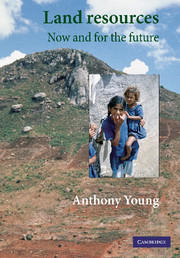Book contents
- Frontmatter
- Contents
- Preface
- Acknowledgements
- Note on acronyms and currency
- 1 Concern for land
- 2 Land resource issues
- 3 Resource survey and land evaluation
- 4 Competition for land
- 5 Working with farmers
- 6 Land use planning
- 7 Land degradation
- 8 Global issues: climatic change and biodiversity
- 9 Monitoring change: land resource indicators
- 10 Costing the earth: the economic value of land resources
- 11 Land management: caring for resources
- 12 Research and technology
- 13 Land, food, and people
- 14 Population, poverty, and conflict
- 15 Awareness, attitudes, and action
- Notes
- References
- Index
4 - Competition for land
Published online by Cambridge University Press: 04 August 2010
- Frontmatter
- Contents
- Preface
- Acknowledgements
- Note on acronyms and currency
- 1 Concern for land
- 2 Land resource issues
- 3 Resource survey and land evaluation
- 4 Competition for land
- 5 Working with farmers
- 6 Land use planning
- 7 Land degradation
- 8 Global issues: climatic change and biodiversity
- 9 Monitoring change: land resource indicators
- 10 Costing the earth: the economic value of land resources
- 11 Land management: caring for resources
- 12 Research and technology
- 13 Land, food, and people
- 14 Population, poverty, and conflict
- 15 Awareness, attitudes, and action
- Notes
- References
- Index
Summary
In addition to its main function for agricultural and forestry production, land is needed for many other purposes, including regulation of the atmospheric and water cycles, mineral supply, nature conservation, settlement, and waste disposal. There is often conflict between competing uses. Some major issues in policy and planning centre upon land use: the supply of arable land, loss of forest cover, and land needed to meet the urban expansion which is a marked feature of the developing world. Land use, the functions which it performs, is distinct from land cover, by plants or built structures. There is a need for common classifications of land use and cover, as a reference base for conversion between national systems. Means are available to survey land use, but in many less developed countries scarcely any reliable surveys have been carried out. As a result, data on land use are among the least reliable of all kinds of international statistics. Until information on land use is improved, development planning will remain without an adequate basis on many major issues. International conventions, such as the World Soil Charter, are of value mainly as a guide to policies at national level. All countries need a national land use policy, under the guidance of a committee at ministerial level, to co-ordinate and reconcile the many sectoral interests.
- Type
- Chapter
- Information
- Land ResourcesNow and for the Future, pp. 48 - 71Publisher: Cambridge University PressPrint publication year: 1998



